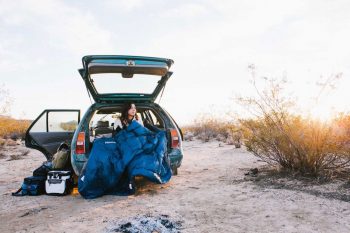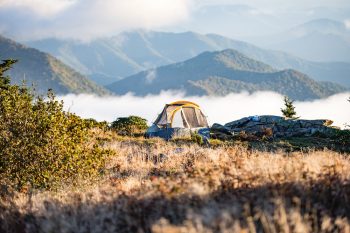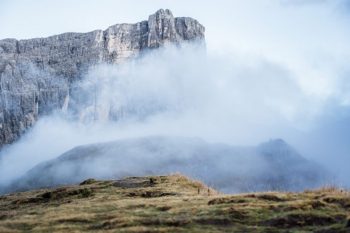There was a time when it was the order of the day to stay in expensive boutique hotels, book all-inclusive if possible, and be looked after from early morning until late in a tourist resort. These times are past. Holidaymakers today no longer want the comprehensive service package; they want adventure, do-it-yourself, and back-to-bush experience. Over the past few years, the number of camping vehicles sold has been rising; many magazines celebrate life in nature, and camping products have become fundamental lifestyle essentials. In short, Camping is trending. In the age group 65 plus, young city dwellers, especially, are becoming increasingly attracted to the outdoors. And those who like it even more individually prefer to go wild camping. Park your car or pitch your tent wherever you are. However, it’s not as easy as it sounds. That’s why we’ve looked at the legislation in Europe and found out where wild camping is allowed and where not.
Are there European countries where wild camping with a tent is allowed or tolerated?


The legalities of wild camping in Europe
In most European countries, wild camping is mainly prohibited. However, this doesn’t mean there are no opportunities to offer an adventure holiday in the great outdoors. Let’s start with the countries where it IS legal to pitch a tent and sleep under the stars. These include countries like Sweden, Norway, Ireland, Estonia, Latvia and Spain. You may pitch a tent in these countries and leave it standing in the same spot for several days. This general permission only refers to state land and not private property.
Wild camping in Spain
A few obstacles arise when wanting to pitch a tent in Spain. Firstly, just about every piece of land in Spain is privately owned. Secondly, especially inland, the ground consists almost entirely of rocks and sharp stones, making it nearly impossible to set up camp. And if you’re fortunate enough to have discovered a spot without rocks and stones, it’s sure to be full of thorns. On the bright side, you can stay in a caravan overnight in designated areas of Spain.
Wild camping in Sweden
One of the great things about Sweden is the freedom to wild camp. The Everyman’s Right, or Allemansrätten, allows you to explore and camp almost anywhere. However, it’s crucial to camp responsibly and respect nature, meaning you should leave no trace behind. After you leave, there should be no evidence of your stay, whether you used a tent, car, or camper. Take all your trash, avoid damaging the environment, and leave the site as you found it.
You are permitted to make a fire unless there’s a fire hazard. For instance, during the summer of 2018, there was a widespread ban on open fires in Sweden due to extreme dryness. If you’re unsure whether fires are allowed, it’s best not to make one. You can use fallen branches and twigs for firewood, but cutting down trees or breaking branches is prohibited. Firewood and starter kits, which can burn for about an hour, are available at many gas stations for a few euros.
Ensure that you are not camping on private property without permission. If you are on someone’s land, you must obtain the owner’s consent to camp there. Often, fences or signs indicate if camping is not allowed. If you’re uncertain about the rules for wild camping in a particular area, consult the local tourist office for guidance. They can also recommend scenic and quiet camping spots.
Additionally, be considerate of others. Avoid playing loud music or making excessive noise, and behave as expected from others. This respectful behavior is a key reason the Everyman’s Right has been upheld in Sweden for centuries, and it would be unfortunate to see it jeopardized by the actions of inconsiderate tourists.
Wild camping in Norway
The Norwegian concept of “freedom to roam” (allemannsretten in Norwegian) is quite generous for nature enthusiasts. It allows you to hike or set up a tent almost anywhere in the wilderness. Wild camping is one of the best ways to experience Norway’s stunning landscapes, and it’s a favorite pastime for both locals and tourists. This unique and immersive experience is also entirely free.
When setting up a tent, the main rule is to pitch it at least 150-200 meters from the nearest cabin or house. Additionally, you must camp in “utmark,” which means unfenced land, so avoid gardens, fields, farms, or any areas with activity and stick to the open wilderness.
You can only stay in the same spot for two nights; you must move your camp. There’s no strict rule on how far to move, but generally, moving at least 50 meters is acceptable.
If you are far from civilization, you can often stay longer than two nights. If you aren’t disturbing anyone, staying for a week or two is usually fine.
A more adventurous summer destination is the dramatic Lofoten islands, inside the Arctic Circle, where camping comes with the added perk of the midnight sun.

Wild camping in Denmark
In Denmark, it’s a whole different ball game again. Expect to pay penalties If you stay outside campgrounds with a caravan. Camping is allowed in at least 40 approved forests. There are penalties of up to 75 euros on tourist beaches if you let yourself get caught wild camping. Oh, and check for ticks!
Wild Camping in Romania
There are no laws in Romania to prohibit wild camping. You can camp everywhere in nature or rural areas in Romania (tent). If you ask the locals, you’ll often hear that camping is not a problem. They’ll tell you that you’ll have a tough time finding an owner who’ll become upset just because you’ve raised a tent for one night. We advise asking permission on privately owned land – it is better to be safe (and polite) than sorry!
Wild camping in France
With the owner’s consent, camping is officially permitted only on private land in France. People generally are very friendly and incredibly open to hikers and cyclists, so you’ll usually find a place soon enough. Along the coast, in specific protected areas, such as national parks and regional nature parks (parc Naturel régional), wild camping is prohibited here in general. The same applies to places near sights. Not advisable to pitch directly under the Eiffel Tower – this can cost you a heady penalty of 1,500 euros if caught! Anyway, there are many local rules, so the best is to find the city hall in the village where you want to camp and ask there. An alternative to city hall is the church, where the priest might tell you whether the local church owns some field in the countryside.
Wild camping in Poland
Poland is not quite as strict. In the last 20 years, not 1 fine hasn’t been imposed for wild camping. From 2021 onwards, a publicly available map was published, highlighting the numerous wild regions where camping is officially tolerated. Check out the governmental website. Nevertheless, be considerate and keep your impact to a minimum; who wants to risk being the first wild camper in Poland in 20 years to get a fine? If in doubt, asking a local farmer for a campground on their pastures is always a good idea. And who knows, you might be invited to a cup of tea.
Wild camping in Germany

Camping wherever you like in Germany is illegal. As in Austria and Switzerland, you can spend a maximum of one night with a caravan in a serviced area. Otherwise, a one-night stay in camping vehicles, if not marked otherwise, is allowed in designated state parking areas.
Without a tent (e.g., a bivy sack), you may sleep almost anywhere for a night outside on private property in Germany. Excluded are specially marked areas and nature reserves. The local officials will decide whether an awning or a tarp is deemed a tent if they discover you. Also, a good idea is to pitch a tent on private land after you’ve gained permission. Generally, it’s a formality to quickly knock at the door in rural areas, asking if it would be OK.
Wild camping in Switzerland and the rest of Europe

Extra caution should be taken when wild camping in Switzerland. Fines of 10,000 euros or more for wild camping and lighting of fires. It is advisable to look for a campsite early enough. Avoid being another storyteller of a climber and other outdoor enthusiasts of meeting up with Swiss law enforcement at 4 am!
The Netherlands, Hungary, Portugal, Russia, Croatia, Serbia, Greece, Bulgaria, Czech Republic, and Slovakia have particularly strict rules for wild campers. Pitching on private land is not even permitted, and rest periods in a caravan parking lot are restricted in these countries.
More tips and reading regarding camping and adventure:
